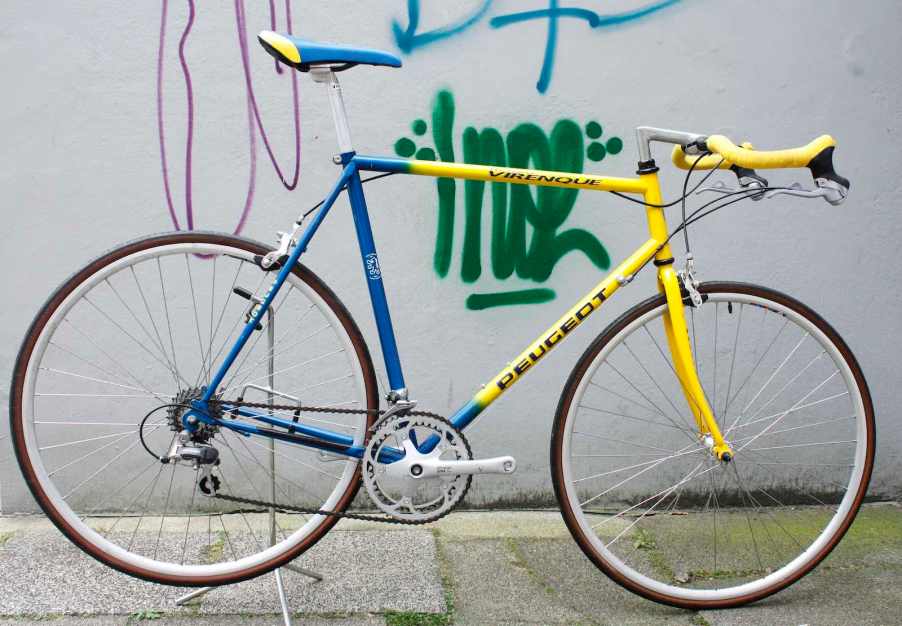
Which Classic Car Companies Actually Built Bicycles Too?
There are now a ton of car brands, mostly luxury ones, that slap their logo on a high-end bicycle. If you are willing to pay enough, you can get a bike that says Mercedes-Benz, Land Rover, or even Ferrari. But if you get on Facebook Marketplace or Craigslist in search of a vintage bike that was truly made by a car company you’re most likely to end up with a Peugeot or a Puch (the company behind the G Wagon).
My buddy texted me, “Let’s ride ‘Slow Roll Detroit!'” I loved the idea of joining the downtown parade with hundreds of other bicyclists. The only problem was that I didn’t own a bicycle. But it was Friday afternoon so I was fairly confident I could find and buy a used road bike in the next few hours. I texted back, “See you there.”
As I scrolled through listings I had an idea for a sort of automotive journalism experiment: I decided I’d buy a bicycle made by a car company. Because I was looking at vintage road bikes, the mid-2000s “Hummer” folding mountain bike was out. I contacted multiple Peugeots and two Puch bikes. But none of their sellers got back to me in time. I ended up joining Slow Roll atop an RX7. A Maruishi RX7 to be exact (no relation to the Mazda). I felt it was a win, considering the short notice. Here’s everything I learned about car companies that make bikes.
First, the “badge engineered” bicycles. The aforementioned “Hummer Tactical Mountain Bike” was a cool folding mountain bike by Montague and marketed to fit in the back of an H2. Ironic because the Hummer line is known for its massive size and could easily swallow an assembled bicycle. But I digress.
The Hummer’s SUV cousin, the Land Rover loaned its name to the 1995 Pashley-Moulton Land Rover All Purpose Bicycle for on and off-road use. This is a bit of a collector’s item now and much less common than the multiple lines of more recent Land Rover mountain bikes.

The “Lotus 108” is the most famous car/bike combination of all time. Though Lotus didn’t design it, that distinction goes to engineer Mike Burrows. The 108 ushered in the era of the carbon fiber road bike with the Lotus badge on its side at the 1992 Olympics. And I’d say it fits with the automaker’s lightweight philosophy. The first production version was the Lotus 110. In 2019, Lotus partnered with Hope Technology to release a high dollar road bike. The latest Lotus Type 136 brings its design philosophy into the e-bike era.
Mini is actually a great name for a whimsical, retro-inspired road bike. This one is a bit of a high-end model with bells and whistles such as turn signals and a 2.4-inch digital display.
Aston Martin’s licensed its name to bikes including the Aston Martin One-77 tie-in built by bf1 which justified a million-dollar price tag with the first integrated data logging. More recently, Aston Martin had J. Laverack build a titanium road bike with 3D-printed titanium lugs, carbon fiber tubing, and the world’s first integrated brake calipers for a completely seamless look, free of any clamping bolts whatsoever.
BMW offers a carbon fiber gravel bike built by 3T as well as a new eBike line. Mercedes-Benz bikes are built by Focus and/or Rotwild. Bianchi builds bikes withe the Ferrari logo. Compagnia Ducale builds some whimsical retro bikes with Alfa Romeo model names. Lamborghini bikes are made by BMC, though 3T made a very limited carbon fiber gravel bike tie-in for the Huracán Sterrato, the Exploro Racemax. Maserati bikes are made by Cipollini and/or Montante.
But if you are looking for affordable, vintage road bikes you probably won’t see any of the above models pop up. So let’s look at Puch and Peugeot.
Peugeot actually began building penny-farthing bikes. By 1926, Cycles Peugeot split from Automobiles Peugeot. That said, both companies still use the same family name and bicycle logo, so a Peugeot bicycle will earn you “bro nods” from your car enthusiast buddies. Peugeot built a ton of road bikes and racing bikes in the 1960s and 1970s. They aren’t the most common brand to find used, but they are out there.
Like the Peugeot brothers in France, Johann Puch got his start building bicycles in the 1890s. But Puch was located in Graz, Austria. The Puch bicycle division went out of business by 1987, the same year the Steyr-Daimler-Puch conglomerate that gave us the G Wagon began to break up. But you can still find Puch racing and road bikes on the used market, known for their excellent engineering and build quality, from the 1970s and 1980s. Today, the brand is being resurrected by Cycleurope, the same conglomerate that builds Peugeot bicycles. And of course, Puch survives as a parts supplier and assembly plant where the Mercedes G Wagon is still made.



